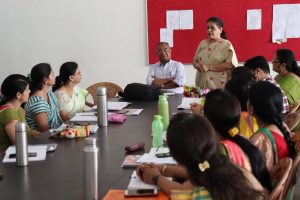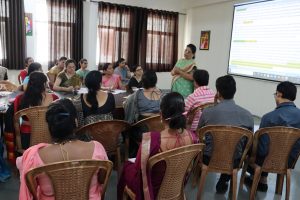ABOUT
Internal Quality Assurance Cell (IQAC) has been established as a post-accreditation quality sustenance measure for performance evaluation, assessment and accreditation and quality up-gradation of institutions of higher education. According to the National Assessment and Accreditation Council (NAAC) every accredited institution of higher education should establish Internal Quality Assurance Cell (IQAC) as a post accreditation quality sustenance measure. The primary responsibility of IQAC is to ensure quality enhancement and sustenance. It ensures the efficiency and effectiveness of measures taken/methods used to provide high quality education and evaluate the degree to which each task is fulfilled. Since quality enhancement is a continuous process, the IQAC will become a part of the institution’s system and work towards realization of the goals of quality enhancement and sustenance.
OBJECTIVE
The Prime objective of the IQAC is to develop a system for conscious, consistent and catalytic action to improve the academic and administrative performance of the institution.
STRATEGIES: IQAC SHALL EVOLVE MECHANISMS AND PROCEDURES FOR:
- Ensuring timely, efficient and progressive performance of academic, administrative and financial tasks.
- The relevance and quality of academic and research programs.
- Equitable access to and affordability of academic programmes for various sections of society.
- Optimization and integration of modern methods of teaching and learning.
- The credibility of evaluation procedures. Ensuring the adequacy, maintenance and functioning of the support structure and services.
- Research sharing and networking with other institutions in India and abroad.
FUNCTIONS: – SOME OF THE FUNCTIONS EXPECTED OF THE IQAC ARE:
- Development and application of quality benchmarks/parameters for the various academic and administrative activities of the institution ,
- Dissemination of information on the various quality parameters of higher education.
- Organization of workshops, seminars on quality related themes and promotion of quality circles .
- Documentation of the various programmes / activities leading to quality improvement.
- Acting as a nodal agency of the institution for quality-related activities.
- Preparation of the Annual Quality Assurance Report (AQAR) to be submitted to NAAC based on the quality parameters.
BENEFITS: – IQAC WILL FACILITATE / CONTRIBUTE:
- To a heightened level of clarity and focus in institutional functioning towards quality enhancement and facilitate internalization of the quality culture NAAC for Quality and Excellence in Higher Education.
- To the enhancement and integration among the various activities of the institution and institutionalize many good practices .
- To provide a sound basis for decision making to improve institutional functioning.
- To act as a change agent in the institution To better internal communication.
The IQAC may be constituted in every institution under the chairmanship of head of the institution with heads of important academic and administrative units and a few teachers and a few distinguished educationists/ representatives of local committee. The composition of the IQAC may be as follows:
- Chairperson: Head of the Institution
- A few senior administrative officers
- Three to eight teachers One or two members from the Management
- One/two nominees from local society
- One of the teachers as the coordinator of the IQAC. The composition of the IQAC will depend on the size and complexity of the institution. It helps the colleges in planning and monitoring. IQAC also gives stakeholders or beneficiaries a cross-sectional participation in the institution’s quality enhancement activities. The guidelines given here are only indicative and will help the institutions for quality sustenance activities. It is necessary for the members of the IQAC to shoulder the responsibilities of generating and promoting awareness in the institution and to devote time for working out the procedural details. While selecting these members several precautions need to be taken. A few of them are listed below:
- It is advisable to choose from various backgrounds who have earned respect for integrity and excellence in their teaching and research. Moreover, they should be aware of the ground realities of the institutional environment. They should be known for their commitment to improving the quality of teaching and learning.
- It would be appropriate to choose as (senior administrators) in charge of institutional services such as library, computer center, estate, student welfare, administration, academic tasks, examination, planning and development.
- The management representatives should be persons who are aware of the institution’s objectives, limitations and strengths and are committed to improvement. The local society representatives should be of high standing and should have made significant contributions to society, and, in particular, to education. The Role of Coordinator/Member Secretary: The coordinator of the IQAC plays a pre-eminent role in ensuring the effective functioning of all the members. The coordinator of the IQAC may be a senior person with expertise in quality aspects. She/he may be a full-time functionary or, to start with, she/he may be a senior academic /administrator entrusted with the IQAC as an additional responsibility. Secretarial assistance may be facilitated by the administration. It is preferable that the coordinator may have a sound knowledge about the computer, its various functions and usage for effective communication. (Source: UGC and NAAC Documents)
Chairperson: – Dr. Renu Pandey
Co-ordinator : – Dr.Vasu Sharma
Members
1. Dr. Fr. Ben Anton Rose
2. Dr. Harkirat Kaur
3. Dr. Aradhana Dhanraj
4. Dr. Roshni Dwivedi
5. Dr. Meenakshi Shobhari
6. Mrs. Aditi Primprikar
7. Mrs. Amita Choubey
8. Mrs. Sonali Chatterjee
Teachers Duty according to criteria
CRITERIA 1. Curricular Aspect
1. Mrs. Aditi Primprikar IC
2. Dr. Shahida Ansari
3. Mrs. Nirmala Mishra
4. Ms. Gurpreet Kaur Bansal
5. Mrs. Seema Pathak
CRITERIA 2. Teaching learning Evaluation
1. Mr. Aman Singh IC
2. Mrs. Suman Mehra
3. Mrs. Ruchi Jain
4. Mrs. Shalini Shivhare
5. Ms. Chhaya
6. Ms. Rajeshweshri
CRITERIA 3. Research Innovation and Extension
1. Dr. Harkirat Kaur IC
2. Dr. Neetu Jat
3. Mrs. Pooja Sharma
4. Mr. Arpit Tiwari
5. Ms. Firdoos Siddique
CRITERIA 4. Infrastructure and learning resources
1. Dr. Roshni dwivedi IC
2. Dr. Preeti Shrivastav
3. Dr. Lajwanti Patel
4. Mrs. Mukta Chouksey
5. Mrs. Rukmani Mishra
6. Mrs. Seema Verma
CRITERIA 5. Student Support and Progression
1. Dr. Aradhana Dhanraj IC
2. Mrs. Shubhi Sharma
3. Ms. Geeta Mali
4. Mr. Shahrukh Khan
5. Mr. Vidya Bhushan Mishra
CRITERIA 6. Governance, Leadership and Management IC
1. Mrs. Sonali Chatterjee IC
2. Mrs. Rati Rai
3. Ms. Shabnam Akhtar
4. Mrs. Padamshree Dubey
5. Mr. Mohammad Asif Shah
CRITERIA 7. Institutional Values and Best Practices
1. Mrs. Amita Choubey IC
2. Mrs. Rajni Yadav
3. Ms. Sadhna Yadav
4. Ms. Chinmey Khare
5. Ms. Upasana Patel
2022
Four Days Faculty Development Programme organised by IQAC from 1st June 2022 to 4th June 2022 in which Dr. Elena Philip (Retd. Dean of Arts and Social Sciences, St. Aloysius College, Sadar) appeared as the resource person.




